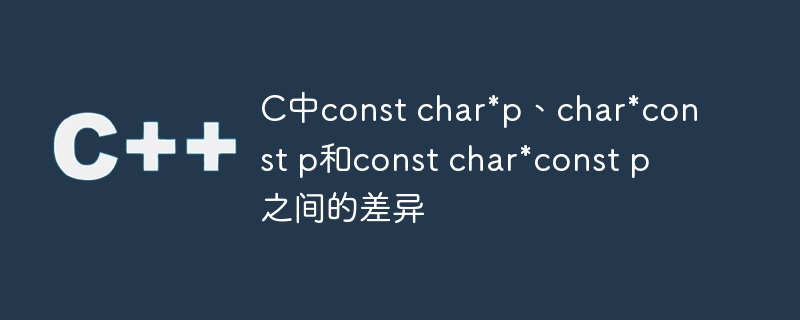

In the C programming language, *p represents the value stored in the pointer, and p represents the address of the value, which is called a pointer.
const char* and char const* indicate that the pointer can point to a constant character, and the value of the character pointed to by the pointer cannot be changed. But we can change the value of the pointer because it is not a constant and can point to another constant character.
char* const means that the pointer can point to a character, and the value of the character pointed to by the pointer can be changed. But we cannot change the value of the pointer because it is now a constant and cannot point to another character.
const char* const means that the pointer can point to a constant character, and the value of the character pointed to by the pointer cannot be changed. We also cannot change the value of the pointer because it is now a constant and cannot point to another constant character.
The principle of naming syntax is from right to left.
// constant pointer to constant char const char * const // constant pointer to char char * const // pointer to constant char const char *
Uncomment the erroneous code and view the error.
Real-time demonstration
#include <stdio.h>
int main() {
//Example: char const*
//Note: char const* is same as const char*
const char p = 'A';
// q is a pointer to const char
char const* q = &p;
//Invalid asssignment
// value of p cannot be changed
// error: assignment of read-only location '*q'
//*q = 'B';
const char r = 'C';
//q can point to another const char
q = &r;
printf("%c</p><p>", *q);
//Example: char* const
char u = 'D';
char * const t = &u;
//You can change the value
*t = 'E';
printf("%c", *t);
// Invalid asssignment
// t cannot be changed
// error: assignment of read-only variable 't'
//t = &r;
//Example: char const* const
char const* const s = &p;
// Invalid asssignment
// value of s cannot be changed
// error: assignment of read-only location '*s'
// *s = 'D';
// Invalid asssignment
// s cannot be changed
// error: assignment of read-only variable 's'
// s = &r;
return 0;
}C E
The above is the detailed content of Difference between const char*p, char*const p and const char*const p in C. For more information, please follow other related articles on the PHP Chinese website!




